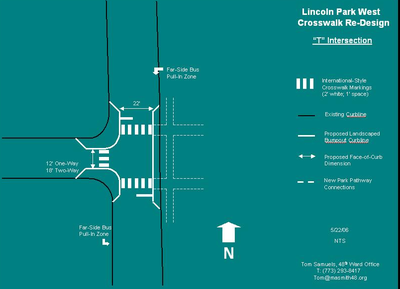Building monuments to Maya Hirsch

Lincoln Park will soon stop buzzing about the death of beautiful 4-year-old Maya Hirsch, killed by a hit-and-run driver May 20. Abraham and I cross that intersection all the time.
I've been to too many funerals and memorials for pedestrians and cyclists in this city. We see accidents like these every few weeks and nothing's ever done to transform the culture of the automobile. Officials aren't callous, but they do react only briefly and inadequately to matters like this instead of taking things out of the box and to a higher level. It's not enough to install a stoplight at one intersection, nor to momentarily discuss traffic calming concepts, nor to call for increased enforcement. The problem is too severe to believe that vehicle deaths in Chicago would be reduced significantly, even if the city were to implement all that's been proposed in the past week.
Today, officials pay lip-service to alternative modes of travel but still prefer to cater to internal combustion. They closed down Queen's Crossing at Grant Park to pedestrians last summer (you now must take a half-mile detour to cross from the lake to Buckingham Fountain, so traffic can speed along). They told bicyclists along Sheridan that they'd be ticketed if they rode on the sidewalks and police are seriously cracking down on things cyclists do that are illegal but not dangerous. They're installing more "pushbutton" crosswalks all over the city (when does a car ever have to push a button to get through an intersection?). The last thing you ever see are permanent crackdowns on car lanes, speed limits, parking entitlement, and a downtown flooded with cars.
I'd like to see some radical thinking on these problems. I remember having some long conversations years ago about this, with Tom Samuels, just after he arrived in Chicago. Samuels, formerly of Toronto, now an aide to Ald. Smith (48th), brought Chicago into the 20th century in traffic planning. In his Canadian life he was a transportation radical. He brought the "bulb-out" streetcorner and other modern traffic planning concepts to Chicago when he was working for CDOT. Tom immediately responded to Maya's death by showing a design for an improvement to that corner. There are other bright thinkers who have great ideas about how to really fix things in this city. But it won't do just to fix one intersection at a time or to make yet another ordinance that can't be enforced. We have to make radical changes to how Chicagoans think about transportation. Let's start by putting Tom Samuels' bulb-outs at every intersection near areas of high pedestrian traffic, and speed bumps galore. How to fund it? Let's start by telling Cong. Rahm Emanuel that the trolleys are nice, but what really makes federal funding work for us are more lasting and transformative monuments to challenge the culture of the car.
